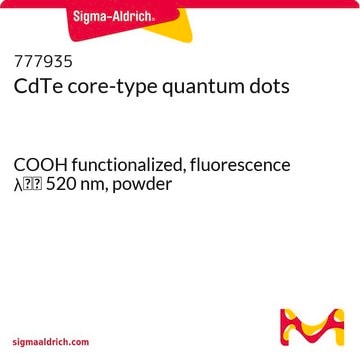추천 제품
분석
≥98% (HPLC)
형태
solid
형광
λex 333 nm; λem 515 nm±5 nm in DMSO
적합성
suitable for fluorescence
저장 온도
2-8°C
일반 설명
This fluorescent labeled catecholamine neurotransmitter analog of dopamine (Product Name: DnsylD-1), with dansyl attached by a 5-carbon spacer arm to dopamine, provides a unique pharmacological tool. DnsylD-1 is a stable, receptor selective and high affinity pharmacological ligand that can be detected by fluorescent microscopy and FLIPR devices. Unlike recently reported synthesized fluorescent neurotransmitter analogs, DnsylD-1 contains the entire native dopamine structural moiety attached with the 5-carbon polylinker to the small fluorescence label dansyl. This structural modification minimizes steric hindrance, making DnsylD-1 an effective reagent for dopamine ligand binding and transporter uptake assays at namomolar concentrations.
A large stokes shift between excitation and emission maxima (Ex:Em, 313:515 nm) of DnsylD-1 provides high signal to noise detection with minimal autofluorescence. The dansyl moiety also changes spectral characteristics on intermolecular contact, facilitating biophysical characterization of ligand-receptor interaction. DnsylD-1 is a suitable substitute for radioactive ligand.
A large stokes shift between excitation and emission maxima (Ex:Em, 313:515 nm) of DnsylD-1 provides high signal to noise detection with minimal autofluorescence. The dansyl moiety also changes spectral characteristics on intermolecular contact, facilitating biophysical characterization of ligand-receptor interaction. DnsylD-1 is a suitable substitute for radioactive ligand.
애플리케이션
Applications for Fluorescent Dopamine Ligand-Neurotransmitter (DnsylD-1)
DnsylD-1 has the following applicability due to the small molecular size of the dansyl fluorescent label, a long spacer arm between the dopamine structure and the fluorescent tag, stability in aqueous solution and low autofluorescence of the surrounding cellular or tissue medium.
DnsylD-1 has the following applicability due to the small molecular size of the dansyl fluorescent label, a long spacer arm between the dopamine structure and the fluorescent tag, stability in aqueous solution and low autofluorescence of the surrounding cellular or tissue medium.
- Histochemical imaging and quantitation of dopamine receptor expression in vivo and vitro.
- Pharmacological applications as a substitute for radioactive ligand.
- Dopamine metabolism and turnover analysis.
- Dopamine uptake analysis.
- Dopaminergic neuron detection.
- Analysis of disease conditions associated with altered dopamine synthesis, dopamine receptor expression or dopamine uptake: human disease research applicability in the following: a) Parkinson′s disease. b) Psychological disorder, including ADHD, schizophrenia and substance abuse. c) Physiological regulation of cardiovascular, renal and immune function.
특징 및 장점
Highlights
- Dansyl labeled dopamine that operates selectively in binding and uptake assays at nanomolar concentrations.
- The native dopamine chemical structure is the major component of this fluorescent labeled catecholamine, which generates a fluorescent neurotransmitter molecule with high affinity toward all dopamine receptor subtypes, as well as to the dopamine transporter.
- The small dansyl tag with a 5-carbon polylinker to dopamine generates a stable, bright fluorescent signal with negligible steric hindrance.
- The dansyl fluorescent tag creates a large stokes shift minimizing autofluorescence and non-specific background signal.
- The fluorescent signal of DnsylD-1 is blockable by standard inhibitors to dopamine receptors and DAT.
- Standard inhibitors can also be employed to distinguish the interaction of DnsylD-1 with dopamine receptors and DAT.
- Fluorescence from DnsylD-1olocalizes with tyrosine hydroxylase thereby identifying dopaminergic neurons.
- To assay for dopamine receptor binding, first suspend the provided solid in DMSO (10 - 50 μl). Centrifuge and then dilute an aliquot of the supernatant into your assay buffer (for example PBS-BSA) to the desired assay concentration. DnsylD-1 when suspended in DMSO and frozen at -20oC is stable for at least 2 years. Detect DnsylD-1 by fluorescent microscopy, with a fluorescent plate reader or by flow cytometry. Set the fluorescent detection device to the following parameters: Ex/Em: 333/515 nm.
기타 정보
Proprietary product of Fivephoton Biochemicals
Storage Class Code
11 - Combustible Solids
WGK
WGK 3
Flash Point (°F)
Not applicable
Flash Point (°C)
Not applicable
시험 성적서(COA)
제품의 로트/배치 번호를 입력하여 시험 성적서(COA)을 검색하십시오. 로트 및 배치 번호는 제품 라벨에 있는 ‘로트’ 또는 ‘배치’라는 용어 뒤에서 찾을 수 있습니다.
자사의 과학자팀은 생명 과학, 재료 과학, 화학 합성, 크로마토그래피, 분석 및 기타 많은 영역을 포함한 모든 과학 분야에 경험이 있습니다..
고객지원팀으로 연락바랍니다.







